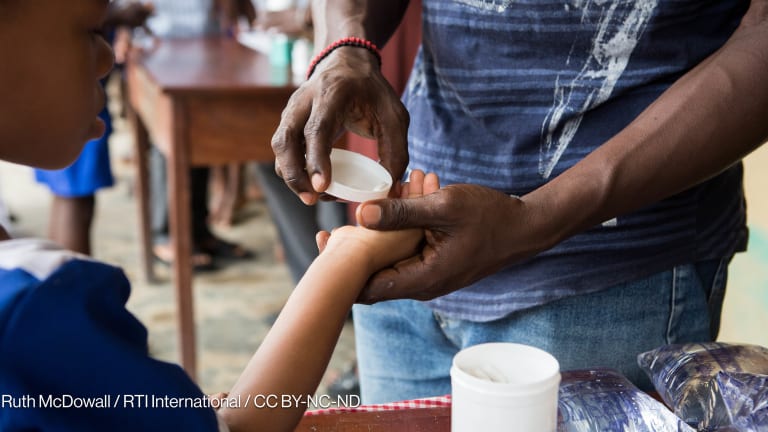
The United Kingdom's aid budget cuts will cause close to 72 million people to miss out on treatment for neglected tropical diseases during the six month period from October 2021 to April 2022, according to data collected by the charity Sightsavers.
Despite the U.K. government’s historical status as a leader in fighting NTDs, it has now performed a “complete withdrawal” from the field, according to Simon Bush, director of NTDs at Sightsavers.
Though treating such diseases is relatively inexpensive, and health workers have been closing in on the elimination of some NTDs in certain places, aid reductions will hinder operations and the distribution of drugs donated by pharmaceutical companies, Bush said.
Those who will miss out on treatment include 24 million people with lymphatic filariasis, 21 million with river blindness, and 22 million with schistosomiasis, as well as 4 million children with intestinal worms — which cause a distended abdomen — Bush said.
Sightsavers led the Accelerating the Sustainable Control and Elimination of Neglected Tropical Diseases, or ASCEND, program in West and Central Africa, but it was ended early as a result of the aid reductions, which left a £38 million ($51.47 million) funding gap.
Overall U.K. funding for NTDs was decreased by £150 million — or around 90% — according to the group Uniting to Combat NTDs.
“The seismic impact of the pandemic forced the tough decision to temporarily reduce the aid budget and exit some programmes, including Ascend,” said an FCDO spokesperson.
Sightsavers is now “desperately trying to fill the funding for this year,” Bush added. The charity has received some philanthropic contributions to help cover the financial holes left by the aid cuts, but gaps remain.
Bush said he is especially worried about NTDs in the Democratic Republic of Congo, Sierra Leone, and Liberia, where drugs need to be distributed soon. He added that he expects 4 million people in Sierra Leone and 2 million in Liberia to miss out on treatment for river blindness unless more funding is found.
“Mass drug administration is required this year, or we get a gap in treatment,” Bush told Devex. “As soon as you get that gap, then the levels of the disease can rise. If we don’t treat, we are possibly going to get the return of the disease in those communities. It’s as stark as that.”
Treating NTDs requires a “continuity of funding, because you can’t just treat one year and achieve elimination; you have to treat over multiple years,” according to Bush. “The communities are looking to get that sort of continuity,” he said, adding that elimination of diseases “is probably the most sustainable part of a health program.”
While the Foreign, Commonwealth & Development Office used to provide “continuity of funding to achieve elimination,” the U.K. department is “unreliable now as a donor,” Bush said. FCDO has “abandoned” the NTD treatment strategy, he said, and community volunteers accustomed to distributing treatment drugs are now deprived of a supply chain and reporting systems.
Because the Sightsavers-led program used volunteers and donated drugs at no cost to the U.K. government, Bush said he was “bewildered” and could not “understand the decision-making” that led to the aid reduction — especially amid recent progress on eliminating NTDs in certain places, such as trachoma in Gambia.
“As soon as you get that gap [in treatment], then the levels of the disease can rise. If we don’t treat, we are possibly going to get the return of the disease in those communities.”
— Simon Bush, director of NTDs, SightsaversThe FCDO spokesperson said the U.K. had “made a significant contribution toward protecting millions of people around the world from such diseases, delivering treatment and care, and strengthening health systems.”
The U.K. “remains one of the largest providers of overseas aid,” the spokesperson added.
The U.K. played a key role in launching the London Declaration on Neglected Tropical Diseases in 2012, which aimed to eliminate or stop the spread of key NTDs by 2020. Last year, the World Health Organization unveiled a new strategy targeted at 20 NTDs, which Prime Minister Boris Johnson said the U.K. “fully” supported.
Bush said: “With the signing-up to the London Declaration [and the U.K. government] being a lead in that, being one of biggest funders of neglected tropical diseases … we thought that [the government] understood the elimination agenda, given the investment that they made. Unfortunately, they are not a reliable partner.”
Sightsavers has been one of the main organizations used by the U.K. government to implement work on NTDs, spending hundreds of millions of pounds since the London Declaration’s launch.
“Reaching that ‘last mile’ [in the delivery of treatment to communities] … has been hard fought, and a lot of investment has gone into that,” Bush added..
“I can’t understand why Global Britain would not want to claim credit for elimination of neglected tropical diseases,” Bush said, referring to the U.K. government’s international strategy. “This [could have been] a very quick win for Global Britain. It was so close in so many countries.”








